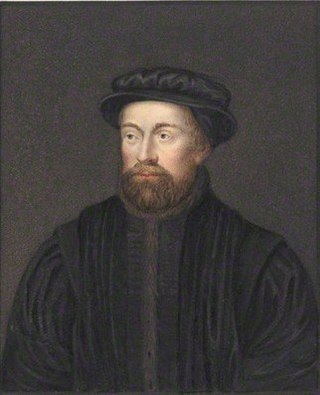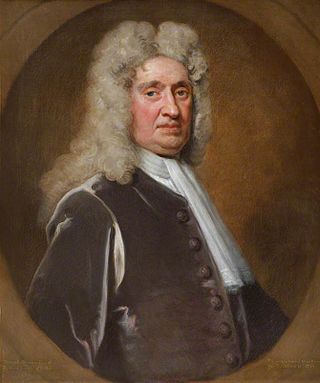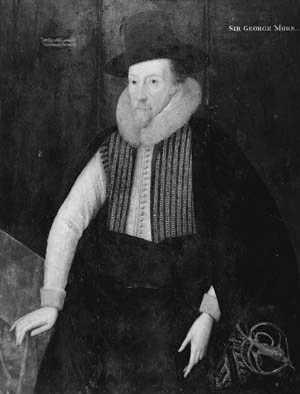Related Research Articles

Sir John Baker was an English politician. He served as Chancellor of the Exchequer from 1545 to his death, having previously been Speaker of the House of Commons of England.
Sir Anthony Irby was an English politician who sat in the House of Commons at various times between 1628 and 1682.
Sir Arthur Onslow, 1st Baronet was an English politician who sat in the House of Commons at various times between 1641 and 1685.
Sir Richard Onslow was an English politician who sat in the House of Commons at various times between 1628 and 1664. He fought on the Parliamentary side during the English Civil War. He was the grandson of one Speaker of the House of Commons and the grandfather of another, both also called Richard Onslow.

Denzil Onslow of Pyrford was a British Whig politician who sat in the English and British House of Commons between 1679 and 1721. Through advantageous marriages, he obtained a country estate and became prominent in Surrey politics of the Hanoverian era, although his great nephew Arthur Onslow, as Speaker, judged that Denzil knew "no more of the business [of the House of Commons] than one who had been of the standing of a session".
Sir Thomas Tyrrell was an English judge and politician who sat in the House of Commons in 1659 and 1660. He fought on the Parliamentarian side in the English Civil War.
Sir John Baker, 2nd Baronet was an English politician who sat in the House of Commons of England in 1640. He supported the Royalist side in the English Civil War.
Sir Thomas Barnardiston, 1st Baronet was an English baronet, landowner, soldier and MP who sat in the House of Commons at various times between 1640 and 1659. He fought on the Parliamentary side in the English Civil War.

Elizabeth Brooke, also known as Lady Brooke or Dame Elizabeth Brooke, was an English religious writer, part of whose writing of Christian precepts survives, and was matriarch of a landed manorial family in East Suffolk, East Anglia, during the English Civil War and Restoration periods.
Sir Rowland Lytton was an English politician who sat in the House of Commons between 1656 and 1660.
Sir Thomas Cheek, Cheeke or Cheke was an English politician who sat in the House of Commons in every parliament between 1614 and 1653.
Sir Robert Parkhurst was an English politician who sat in the House of Commons between 1625 and 1651. He supported the Parliamentary cause in the English Civil War.
Sir Robert Parkhurst was an English merchant who was Lord Mayor of London.

Sir George More was an English courtier and politician who sat in the House of Commons at various times between 1584 and 1625.
Sir Robert Brooke was an English landowner, magistrate, commissioner, military officer, knight and MP who sat in the House of Commons from 1660 to 1669. Dying at the age of 32, his promise was cut short, and the core of his estates in East Suffolk passed by marriage into the Blois family.
Francis St John was an English lawyer and politician who sat in the House of Commons at various times between 1654 and 1698.
Robert Mitford (1612–1674) was an English politician who sat in the House of Commons in 1659.
Sir Philip Howard was an English soldier and politician who sat in the House of Commons between 1659 and 1679.
Sir William Beecher was an English politician who sat in the House of Commons from 1667 to 1679.
Sir Thomas Williams, 1st Baronet was a Welsh medical doctor and politician who sat in the House of Commons from 1675 to 1679. He was "Chymical Physician" to King Charles II.
References
- 1 2 Parkhurst Family
- ↑ "Parkhurst, Robert (PRKT647R)". A Cambridge Alumni Database. University of Cambridge.
- ↑ Parishes: Pyrford, A History of the County of Surrey: Volume 3 (1911), pp. 431-436. Date accessed: 2 March 2011
- ↑ Willis, Browne (1750). Notitia Parliamentaria, Part II: A Series or Lists of the Representatives in the several Parliaments held from the Reformation 1541, to the Restoration 1660 ... London. pp. 229–239.
- ↑ Knights of England